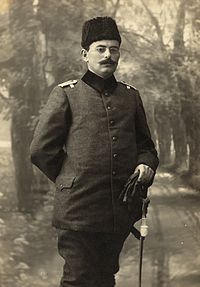
Back توفيق كنعان Arabic توفيق كنعان ARZ Tofiq Kənan Azerbaijani Tawfiq Canaan Spanish توفیق کنعان Persian Tawfiq Canaan French תאופיק כנעאן HE Tawfiq Canaan ID
Tawfiq Canaan | |
|---|---|
 | |
| Born | 24 September 1882 |
| Died | 15 January 1964 (aged 81) |
| Nationality | Palestinian |
| Occupation(s) | Physician, Ethnographer, author |
| Known for | Pioneer in the field of medicine in Palestine Researcher of Palestinian popular heritage |
| Parent(s) | Bechara Canaan and Katharina Khairallah |
Tawfiq Canaan (Arabic: توفيق كنعان) (24 September 1882 – 15 January 1964) was a pioneering Palestinian physician, medical researcher, ethnographer, and Palestinian nationalist. Born in Beit Jala during the rule of the Ottoman Empire, he served as a medical officer in the Ottoman army during World War I.[1]
During British rule, he served as the first President of the Palestine Arab Medical Association founded in 1944, and as the director of several Jerusalem area hospitals before, during, and after the 1948 war. Over the course of his medical career, he authored more than thirty-seven studies on topics including tropical medicine, bacteriology, malaria, tuberculosis, and health conditions in Palestine, and contributed to research that led to a cure for leprosy.[2][3]
Deeply interested in Palestinian folklore, popular beliefs, and superstitions, Canaan collected over 1,400 amulets and talismanic objects held to have healing and protective properties. His published analyses of these objects, and other popular folk traditions and practices, brought him recognition as an ethnographer and anthropologist.[4][5][6] The several books and more than 50 articles he wrote in English and German serve as valuable resources to researchers of Palestinian and Middle-Eastern heritage.[2][4] Canaan also published works in Arabic and was fluent in Hebrew.[7]
An outspoken public figure, he also wrote two books on the Palestine problem, reflecting his involvement in confronting British imperialism and Zionism.[2][8] He was arrested by the British authorities in 1939. The last two decades of his life were lived in the shadow of several personal tragedies: the loss of his brilliant son in an accident at Jerash, the loss and destruction of his family home, and of his clinic in Jerusalem during the 1948 war.[9]
Canaan managed to re-establish his life and career in East Jerusalem under Jordanian rule. First taking sanctuary in a convent in the Old City for two years, he was appointed director of the Augusta Victoria Hospital on the Mount of Olives, where he lived with his family through his retirement until his death in 1964.[10]
- ^ Mershen 2006, p. 252
- ^ a b c Nashef 2002, p. 13
- ^ El-Eini 2006, p. 88
- ^ a b al-Ju'beh 2005, p. 103
- ^ Davis 2004
- ^ Benvenisti 2000, p. 252
- ^ Mershen 2006, p. 253
- ^ Bernstein 2000, p. 123
- ^ Lapp & Albright 1964
- ^ Nashef 2002, p. 25